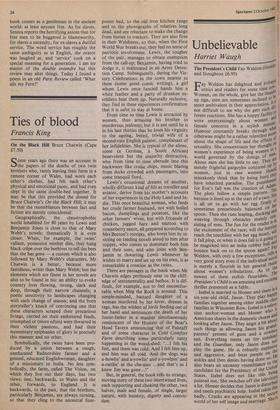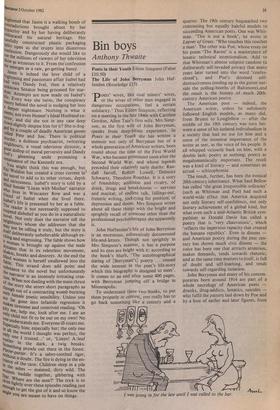Unbelievable
Harriet Waugh
Fay Weldon has delighted and irritated critics and readers for some time rit Women, on the whole, give her the thumbs up sign, men are sometimes inclined to be more ambivalent in their appreciation. It cis not difficult to see why she gets such dit" ferent reactions. She has a happy facility to write entertainingly about women an female concerns in a stylish manner. Humour constantly breaks through What otherwise might be a rather relentless MI about the shape of life and the effects 0 sexuality. She concentrates her thought °it, women's experience of being women in ° world governed by the doings of metle' About men she has little to say. They ,, merely frightful gargoyles conjured uP ld women, just in case women sh°,„ °„ mistakenly think that by being born Ow, have inherited paradise. The punish for Eve's fall was the creation of Adat0; The plots follow a simple pattern. TIL heroine is lined up at the start of a race. 55; is all set to go with her egg firmly her sometimes precariously balanced on spoon. Then she runs leaping, ducking all weaving through obstacles mainly e°n . sisting of men. The fun for the reader is lac ' the excitement of the race; will the ller°i11 w1 reach the touchline with her egg intact, "'i11 tad be fall plop, or when it does fall is it going tv, be magicked into an india rubber ball ao bounce back on to the spoon again. Fa):a Weldon, with only a few exceptions, tells very good story even if the individual Ove., is merely a flourish in her
general
about women's tribulations. As to the newest of these stylish flourishes, The President's Child is an amusing and excit'ab
thriller presented as a fable. thes.1!
Isabel is married to Homer and there's a six-year-old child, Jason. They play haPPY, families together among other middle-claS, families in Wincaster Row. Isabel is a telev.1: sion anchor-woman and Homer who 1: American shares in the domestic chores an looking after Jason. They angst a bit anti: such things as allowing Jason his gran parents' present of guns and a coviu", suit. Everything seems set for sunshio', and the Guardian, only Jason does not play the game. He is robustly and aggressive, and bites people on tge ankles and then denies having done so. also bears an uncanny resemblance to the candidate for the Presidency of the United States. Isabel does not like this being pointed out. She switches off the television a lot. Homer decides that Jason is disturbed is and needs psychiatric help. Isabel takes „ badly. Cracks are appearing in the secur.'_ world of her self image and marriage. She 15
eXPIOle
frightened that Jason is a walking bomb of contradictions brought about by her hYPI5crisY and by her having deliberately obliterated his natural heritage. Her carefully constructed plastic packaging Splits open as she erupts into disastrous confession. Dangerously she would like to use the millions of viewers of her television Show as witnesses to it. From the confession she emerges as a raw, go-getting hussy.
„Jason is indeed the love child of a
had and passionate affair Isabel had nad with Dandy Ivel, then a relatively Unknown Senator being groomed for star- fl,,c4n. Attempts are now made on Isabel's Every way she turns, the conspiracy theorY behind the novel is nudging her into a deeper nightmare. Nothing is what it seems, not even Homer's Ideal Husband ex- terior and did she not in any case deep 'own slightly despise him for it? She is dog- ged by a couple of deadly American goons murder, Pete and Joe. There is political u ,,nrder, a dubious psychiatrist, twittering 'eighbours, a venal television director, a teat dollop of moral perversity and Dandy
S gleaming smile promising a renaissance of the Kennedy era.
p You might think this was enough, but, the Weldon has created a cross current in' `de novel to add to its other virtues, depth 2blind seriousness. Isabel's story is told by a ,11d female 'Listen with Mother' narrator ;".° lives in Wincaster Row and was a friend of Isabel when she lived there. Lsabel's life is presented by her as a fable. The reader is not necessarily supposed to suspend disbelief as you do in a naturalistic neighbours Not only does the narrator tell the geIghbours whom she addresses that she may not be telling it truly, but the story is elf deliberately unbelievable although ex- C,Iting and engrossing. The fable shows how Woman is brought up against the male :auto that in its relentless movement, bkes, breaks and destroys. At the end the fat d Woman is herself swallowed into the se. This strand does add point and u°stance to the novel but unfortunately the narrator is an intensely irritating crea- tion. When not dealing with the main thrust tv,t the story she utters short paragraphs as ,ni°4r 11 out of a contracting womb bursting aith
.emale poetic sensibility. Unless you far gone into infantile regression it 'n.akes tiresome and contrived reading. 'Oh Pity
me, help me, look after me. I am an only child not fit to be out on my own! No tune understands me. Everyone ill-treats me. inSPe,ciallY him; especially her; the only one 411 the world I thought was perfect, the ,.nlY one I trusted...' or, 'Listen! A leaf _
iu the dark, a twig breaks.
75ornet „„ prate prowls out there in the forest. Zuter-Patter. It's a sabre-toothed tiger, "°nt a doubt. The fire is dying in the en- nf the cave. Children sleep in a pile nce women ashes — maimed, dirty wild. The f nnien huddle together, gibbering with sier. Where are the men?' The trick is to eninni lightly over these episodes reading just an-"ugn to get the gist of it and so know the Ile You are meant to have on things.







































 Previous page
Previous page